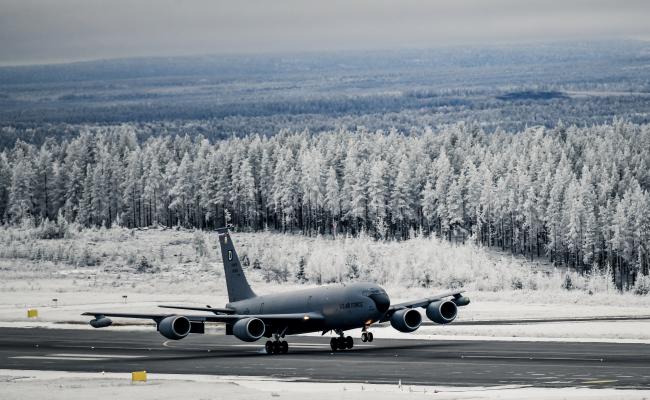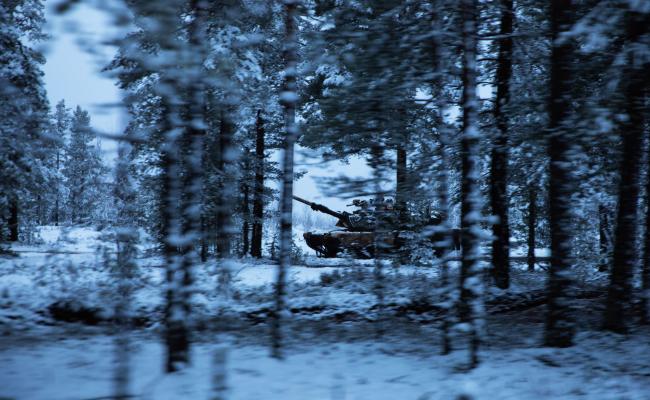New Agreement Gives US Access to Four New Military Areas in the North

The US Ambassador to Norway, Marc Nathanson, and Norway's MoD Bjørn Arild Gram (Labor) at the signing of a re-negotiated supplementary defense cooperation agreement on Friday. The agreement will be sent to a hearing before being considered in the Norwegian parliament. (Photo: Asgeir Spange Brekke/the Norwegian Ministry of Defense)
Norway and the US agree to expand their defense cooperation agreement to include new agreed areas. In Northern Norway, these are Andøya and Bardufoss air stations, Setermoen garrison, as well as a mountain complex in Evenes municipalty. The Norwegian parliament must approve the agreement.
Norway and the USA signed a Supplementary Defense Cooperation Agreement (SDCA) in the spring of 2021. This was approved by the Norwegian parliament in the summer of 2022 and then entered into force.
Now the two countries want to expand this cooperation to include additional military bases and facilities on Norwegian soil.
On Friday afternoon, Norwegian MoD Bjørn Arild Gram and the US Ambassador to Norway, Marc Nathanson, signed an amendment agreement establishing eight new agreed areas.
The US already has unimpeded access to and use of four military bases in Norway. In Northern Norway, these include the Ramsund Naval Station and Evenes Air Station.
15 military bases
If the Norwegian parliament ratifies the new agreement, US forces will also have access to the following places in the north: Andøya Air Station, Bardufoss Air Station, Setermoen garrison (including firing range and exercise area), and Osmarka mountain facility in the vicinity of Evenes Air Station.
In December, Sweden and Finland signed similar bilateral defense agreements with the US.
Provided approvement in the parliaments, US forces will be able to operate relatively freely on the 15 military bases and areas on the Cap of the North:
- Northern Norway: Six agreed areas (12 nationally)
- Northern Sweden: Four agreed areas (17 nationally)
- Northern Finland: Five agreed areas (15 nationally)
In more detail, the map shows the following suggested agreed areas in the neighboring countries:
– Northern Sweden: Kiruna military camp and exercise area; Boden garrison and exercise area; Vidsel Air Station and test area; Luleå-Kallax Air Station.
– Northern Finland: Ivalo Border Guard Base; Rovajärvi exercise area and military storage area; Rovaniemi Air Station and the Jaaeger Brigade garrison (also in Rovaniemi); Tervola military storage area; Veitsiluoto military storage area.
A serious backdrop
"In today's security policy situation, we must strengthen the relationship with our allies. It is important to our security and for the entire Nordic region. The US is a close ally, and the cooperation between our two countries has developed over more than 75 years," says MoD Gram and continues:
"The security policy and operative needs are greater and more serious now than when the supplementary agreement was negotiated in 2021. Additional agreed areas in Norway will also have a positive value in a Nordic context," he maintains.
The Ministry of Defense points out that the signed bilateral agreements between the US and Sweden, Finland, and Denmark are built on the same structure as the Norwegian-American SDCA.
"This implies great potential for even stronger Nordic defense cooperation. This will strengthen Norway, the Nordic countries, and NATO," says Norwegian MoD Espen Barth Eide (Labor).
Power can thus be exerted by any American troop member
Use of agreed areas and exertion of authority
In the agreed areas, the USA will be able to exercise and train, deploy forces, and store materiel – jointly with Norway (or the other respective countries). American forces can also gain exclusive access and right of use to parts of these areas by separate agreement.
American force members can exercise authority over the citizens of the country in question within and in the immediate vicinity of such areas. In extraordinary cases, American forces may also take such measures beyond the immediate vicinity of agreed areas.
"Power can thus be exerted by any American troop member towards Norwegian civilians to restore order or protect the force," wrote the Judge Advocate General, Sigrid Redse Johansen, in a hearing note.
Another central aspect of Norway and Sweden's DCAs is that US authorities will have the first right to prosecute American soldiers who have committed criminal offenses also outside of duty. The Finnish-American agreement is somewhat unclear on primary jurisdiction for crimes committed outside of service.






